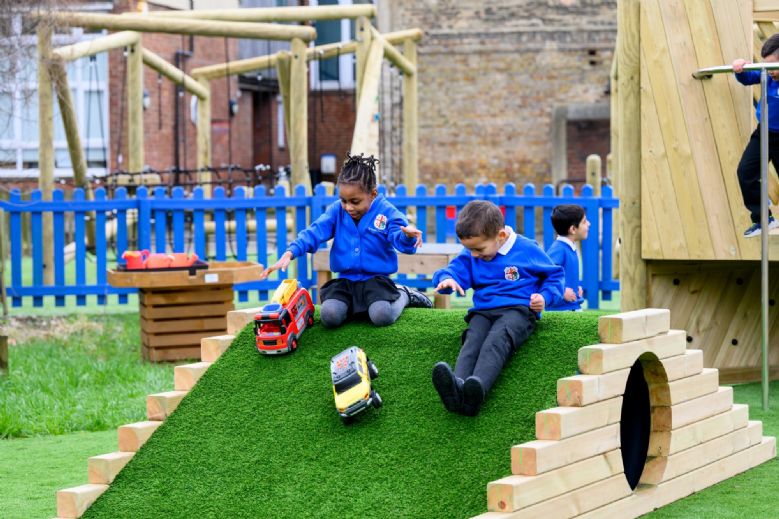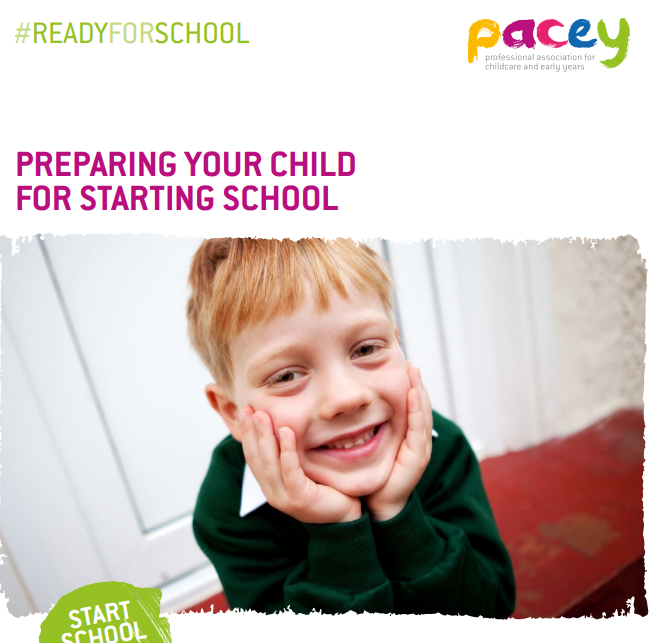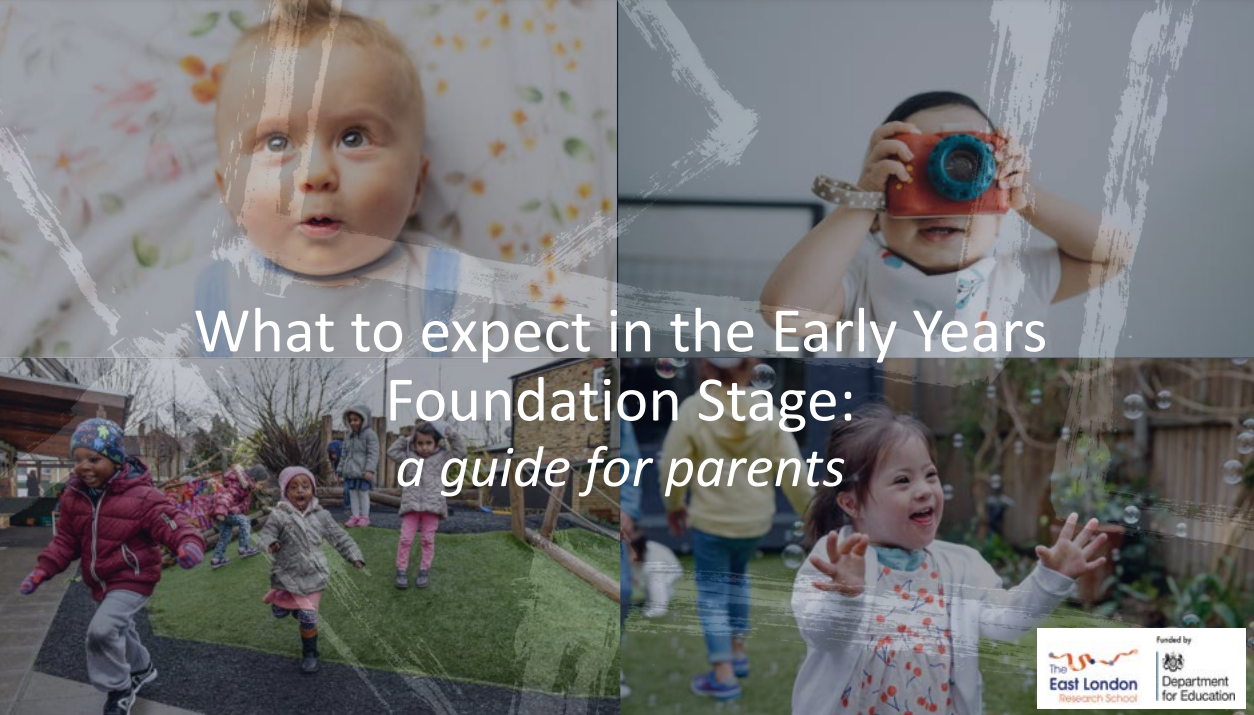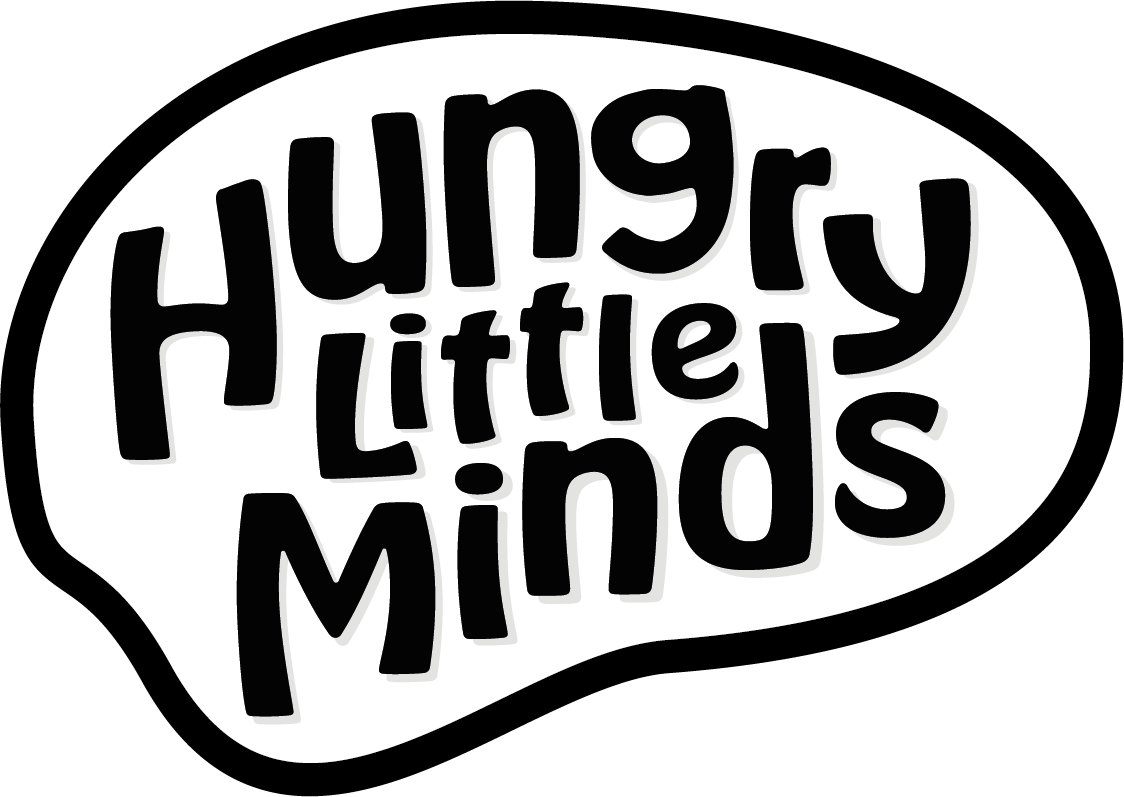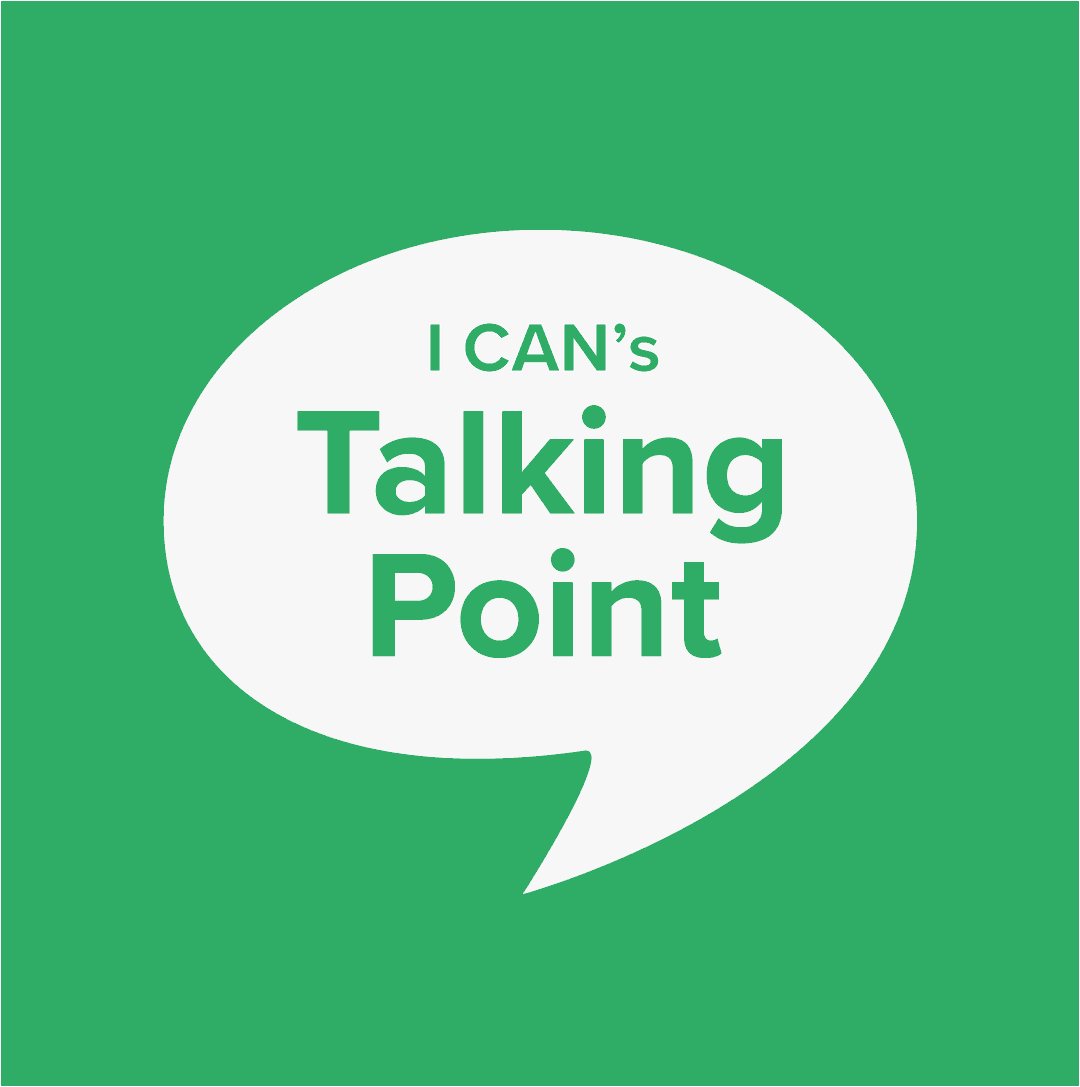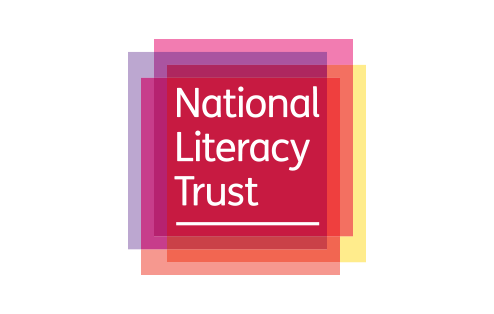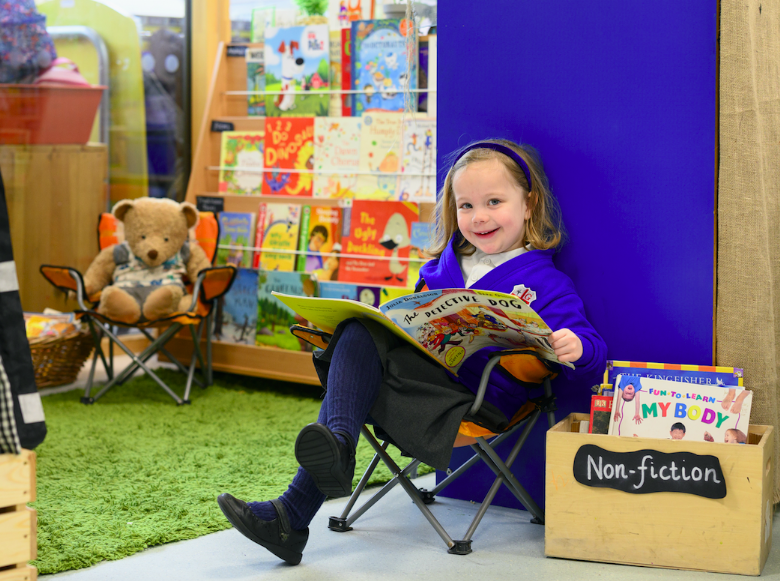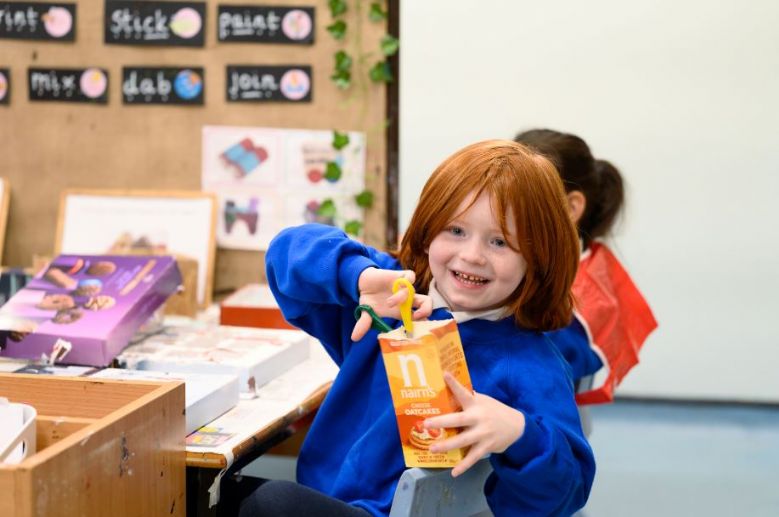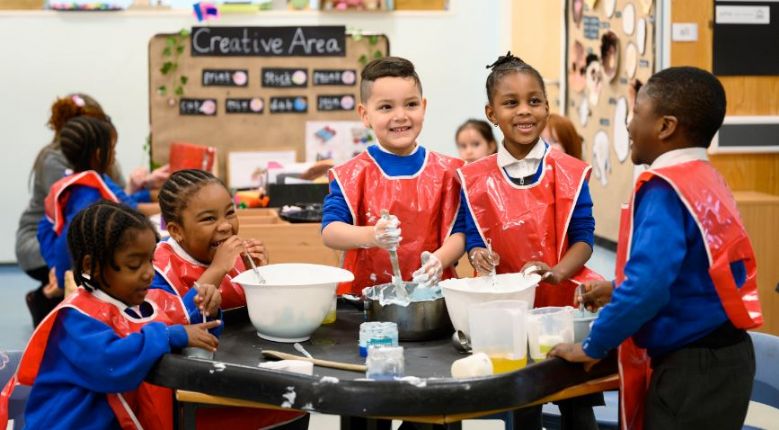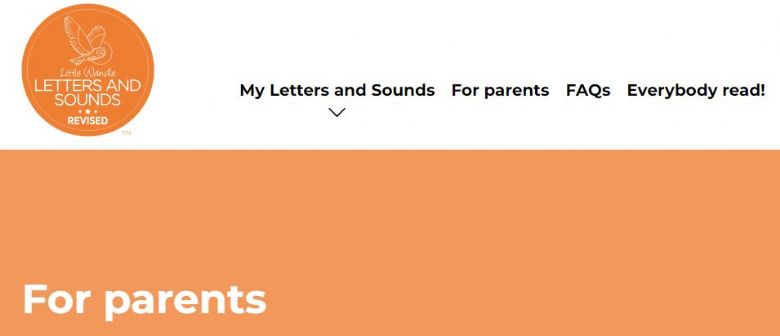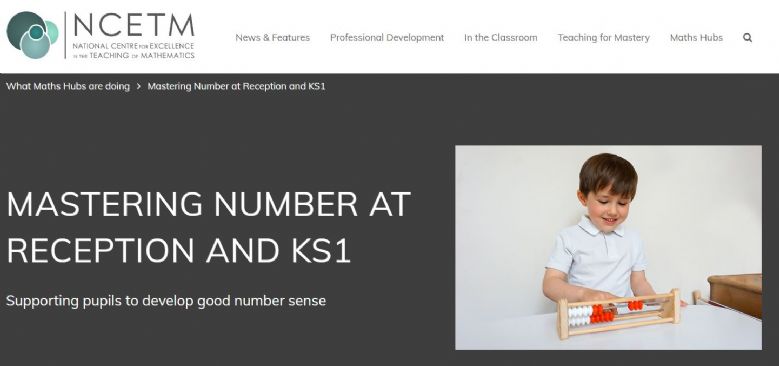Early Years and Foundation Stage
Be an Explorer.
Be a Trier.
Be a Talker.
Be a Creator.
Our EYFS Curriculum Vision Statement
Be an explorer. Be a trier. Be a talker. Be a creator.
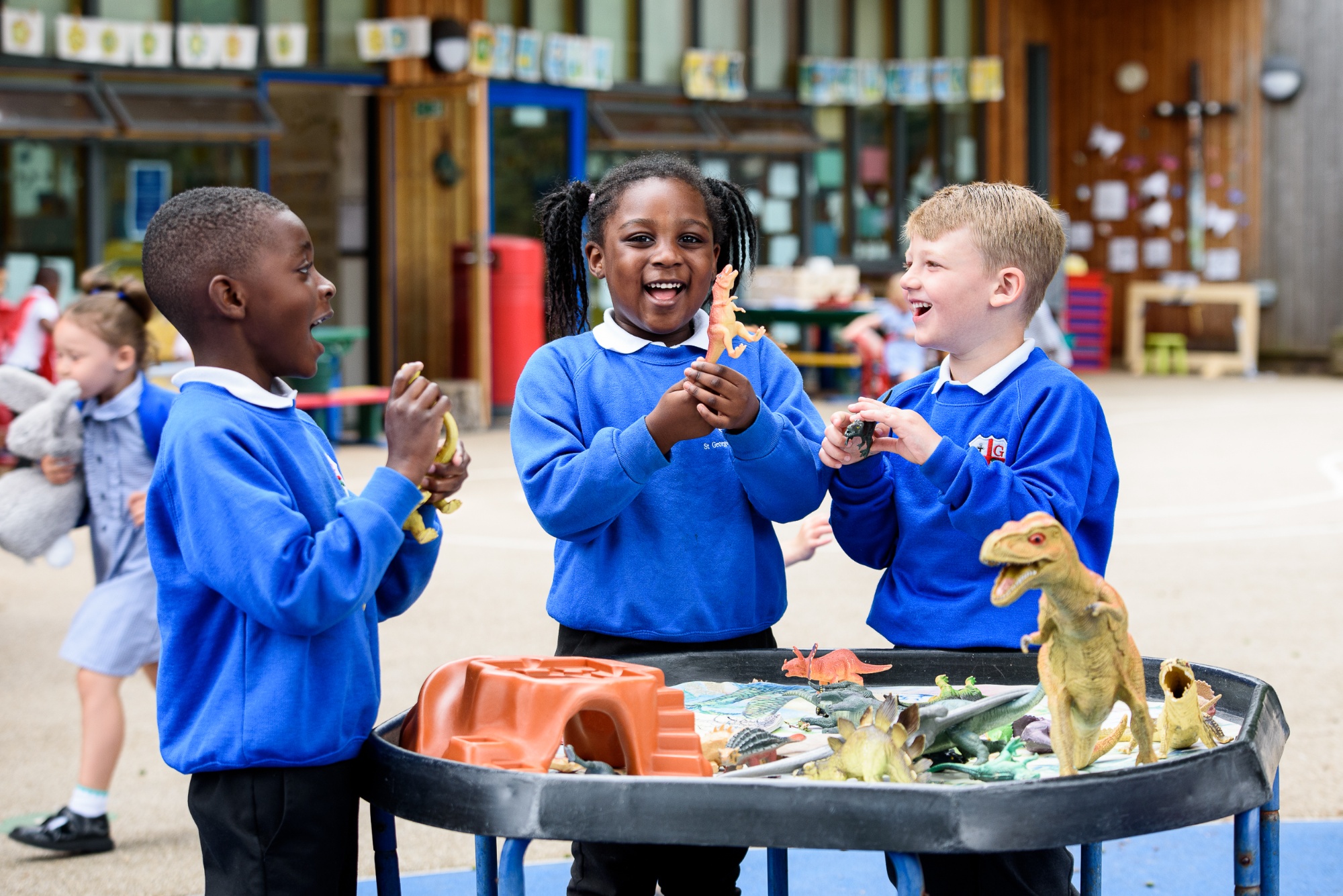
Intent
Our intent is to deliver the learning, development and care outlined in the Statutory Framework for the Early Years Foundation Stage (2021), augmented with powerful knowledge carefully selected to build upon our pupils’ starting points of cultural capital.
Implementation
All areas of our curriculum are implemented using ten principles of effective instruction outlined in our Teaching Touchstones, which work in symbiosis with the Gradual Release Towards Independence model for teaching.
In the Early Years we work to provide for our children the broad range of knowledge and skills that will supply ‘the right foundation for good future progress through school and life’ (Statutory Framework EYFS 2021). The four guiding principles of the EYFS shape our practice: the uniqueness of each child; the importance of positive relationships; an enabling environment; and the recognition that children learn and develop at different rates.
We are passionate about providing a curriculum that allows our children to learn through high quality, play based, inquiry-led learning, with access to a stimulating, language-rich, indoor and outdoor environment.
Impact
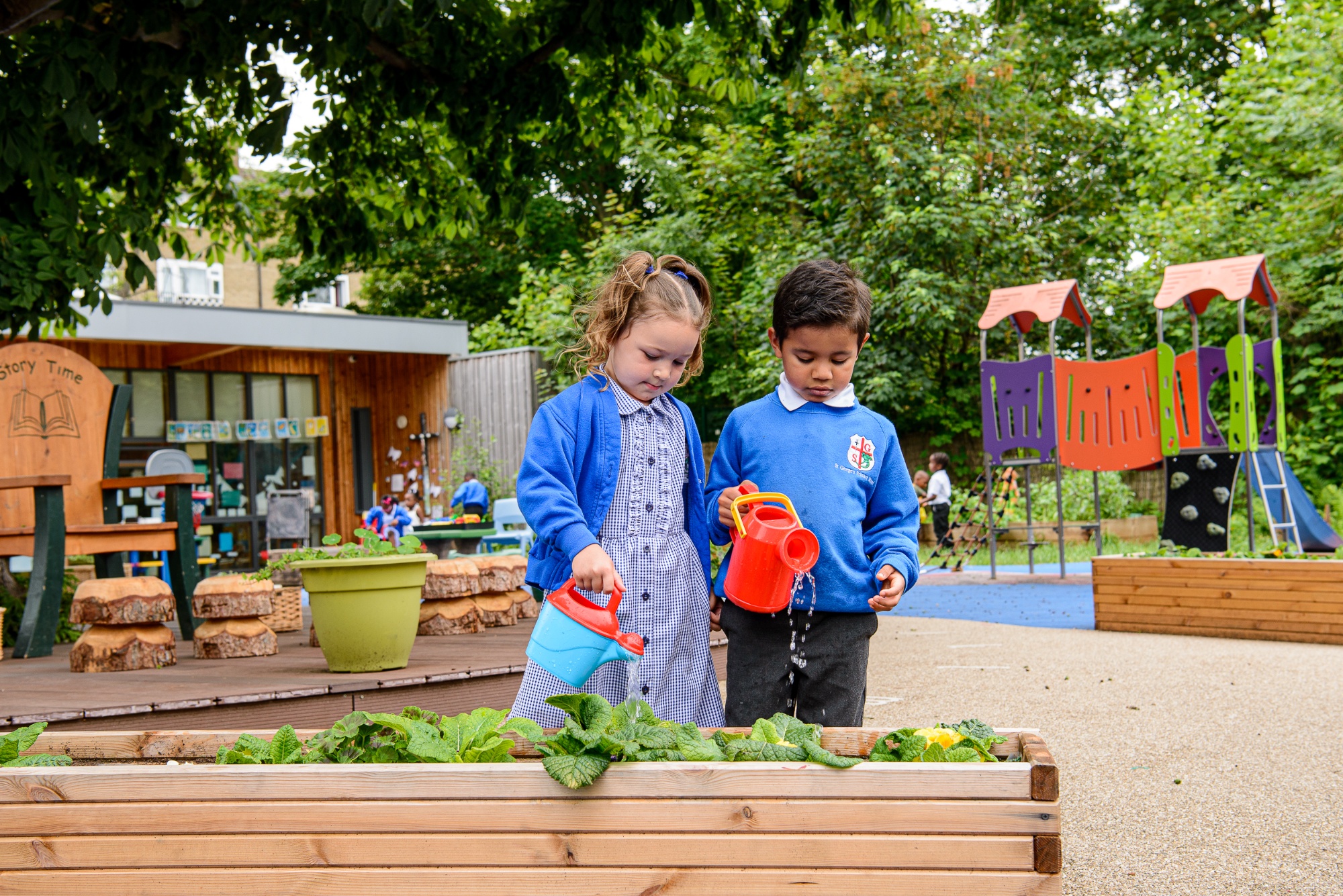
The impact of our curriculum is directly aligned to our whole school vision and culture statements, as well as the EYFS vision statement and the aims and purposes set out in the EYFS statutory framework (2021)
We say to our pupils:
Be an explorer
This means we want our pupils to:
Be brave:
- Ask questions about the world around them.
- Explore the world around them, having the confidence to access and experience the full range of learning experiences offered to them.
- Have the bravery to let curiosity guide them to further learning and exploration.
Be great:
-
Find their own answers to questions through their inquiry led learning and exploration.
-
Think about, and reflect on, new learning, using this as a foundation for further exploration.
Be you:
-
Enjoy independently choosing their own new experiences, further learning and challenges.
-
Have confidence in finding out about their own unique place in the world and be comfortable with the uniqueness of others.
Be a trier
This means we want our pupils to:
Be brave:
-
Have-a-go and use a growth mindset when faced with challenges.
Be great:
-
Persist, undeterred by set-backs.
-
Be resilient, enjoying and seeking out new challenges.
Be you:
-
Be able to keep on going - even if nobody else wants to.
Be a talker
This means we want our pupils to:
Be brave:
-
Initiate verbal communication with others.
-
Ask questions willingly.
-
Offer ideas confidently.
-
Offer explanations clearly.
Be great
-
Learn, and be both keen and confident to use, new vocabulary.
-
Enjoy conversation and hold high-quality back-and-forth exchanges with both adults and friends.
Be you:
-
Be willing, able and confident to express and explain their own personal opinions.
-
Be willing, able and confident to express and explain their own personal feelings.
Be a creator
This means we want our pupils to:
Be brave:
-
Be willing to engage with new ways of learning, creating, and interacting, across all areas of the curriculum.
Be great:
- Be able to develop their own new ideas, working towards their own creative, imaginative and inventive outcomes.
-
Be interested in, and respond constructively to, the creativity of others.
Be you:
-
Be confident to show, share and discuss their own new ideas, inventions and creations.
Links for Parents
The Early Learning Goals
The level of progress children should be expected to have attained by the end of the EYFS is defined by seventeen Early Learning Goals, which are spread across the seven Areas of Learning and Development. These Early Learning Goals can be downloaded using the link at the bottom of this page.
For more information on the Early Years Profile, please click on the image below to visit the government website.
Our Ambitious Learning Environment
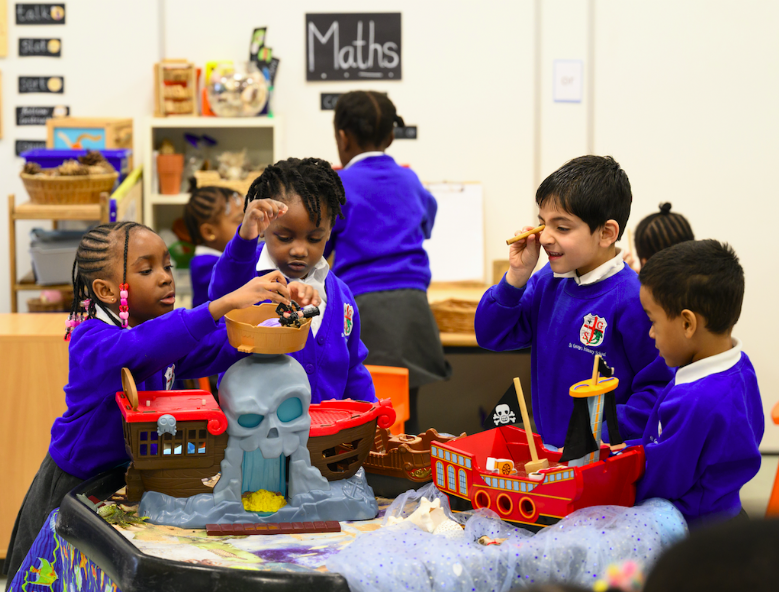
We are extremely fortunate to have a new, purpose-built, early years building. This modern building houses both our nursery and reception classes and allows the children to benefit from both time spent in their own classrooms, but also carefully planned time together - enabling challenge and variety in their learning and input from a range of very experienced early years practitioners. Children who attend our nursery and then move on to our reception class particularly benefit from this close early years partnership.
Learning in the early years at St George's is further enhanced by our incredible outdoor space which contains new, purpose-built climbing and balancing equipment, a gardening area, bike track, mud kitchen, stage area and an exploration station equipped with both sand and water play. We are extremely fortunate that our children are able to play outdoors in both the sun and the rain as we also benefit from a large outdoor covered area.
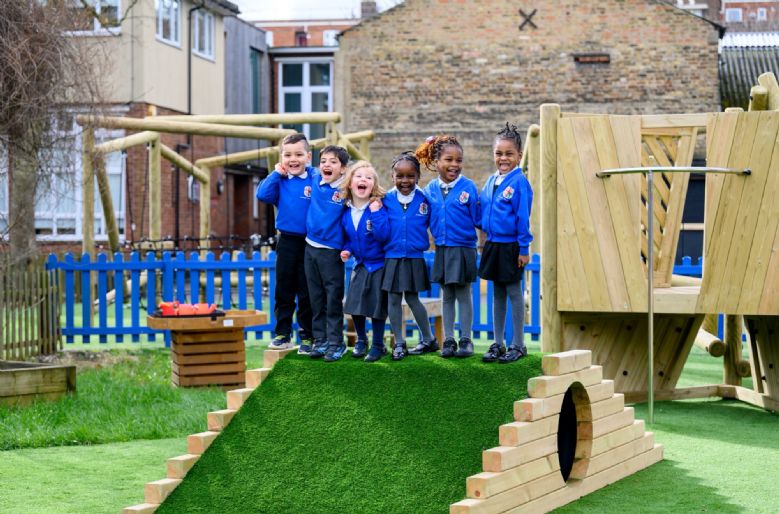
Indoor Environment
Our indoor environment is zoned with carefully planned, purposeful provision which links to current topics, the children's interests and each of the Early Learning Goals. We have a creative area, messy/malleable area, small world, fine motor, phonics, maths and writing area as well as a snack table to encourage independence.
Small World and Role Play
The small world and role-play areas are great for developing children's social skills as well as their communication and language. There are also opportunities to be imaginative and expressive as children invent, adapt and recount narratives and stories with peers and adults. The role-play area may change to link to children's interests or current topics. For example in the picture below we turned it into a space station to link with our Summer Term topic 'Journeys'.
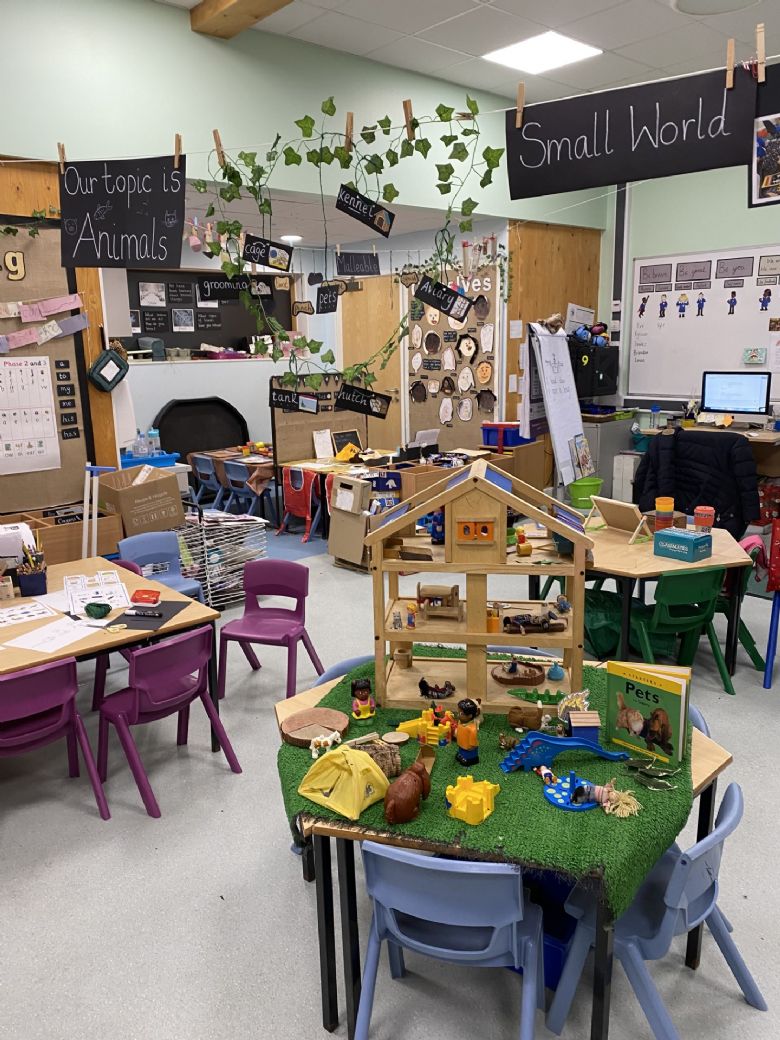
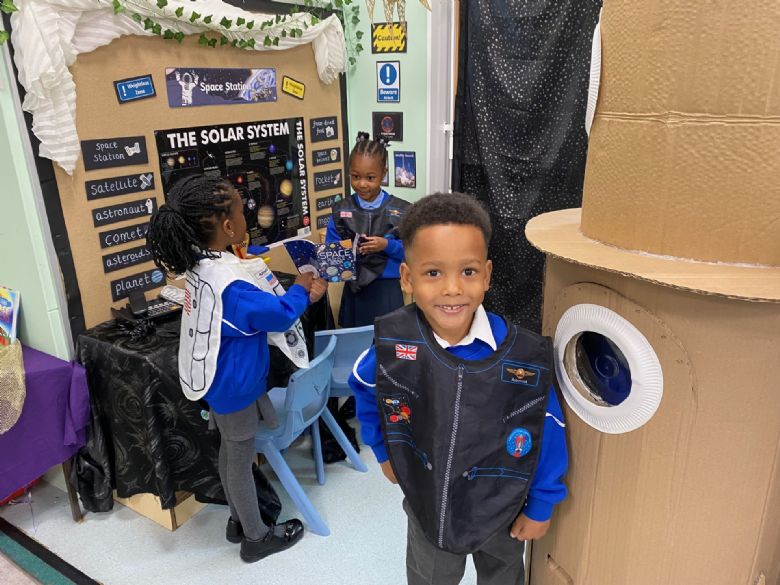
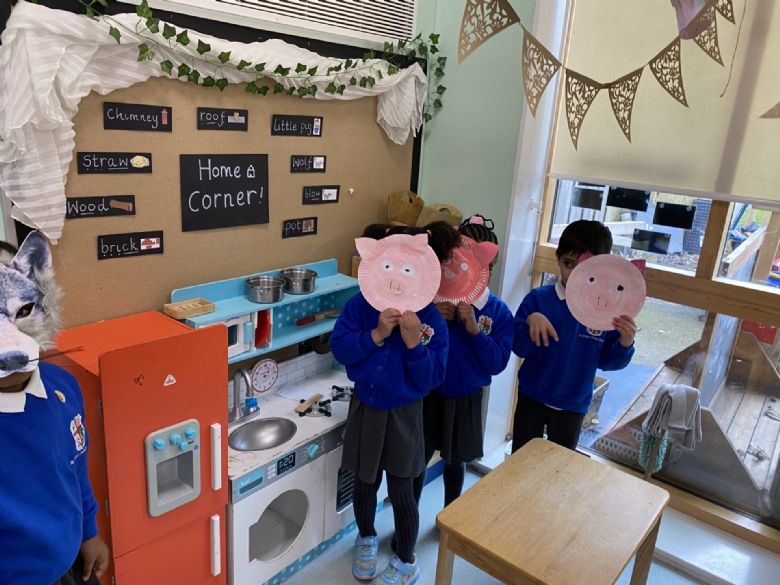
Creative Area
The Creative Area provides opportunities for children to safely use and explore a variety of materials, tools and techniques. For example, pupils have access to: junk modelling; paint; collage; and printing. We encourage the children to talk about their creations and explain the process they have used. This area also supports fine motor skills development through the use of a range of tools such as scissors and paintbrushes.
Malleable/Messy Are
The malleable area provides opportunities for the children to explore using their senses, develop new vocabulary, use their imaginations and play collaboratively with others. There are also links to maths through capacity as well as the development of fine motor skills.
Maths and Writing Area
The writing table is an area where children can self-select, mark-make and apply their developing phonics knowledge to writing for a range of purposes. Children have access to a range of resources and writing equipment such as notebooks, whiteboards, paper, pens, pencils, chalk, crayons etc.
We also have writing books where the children complete adult focus tasks linked to our phonics learning or core text.
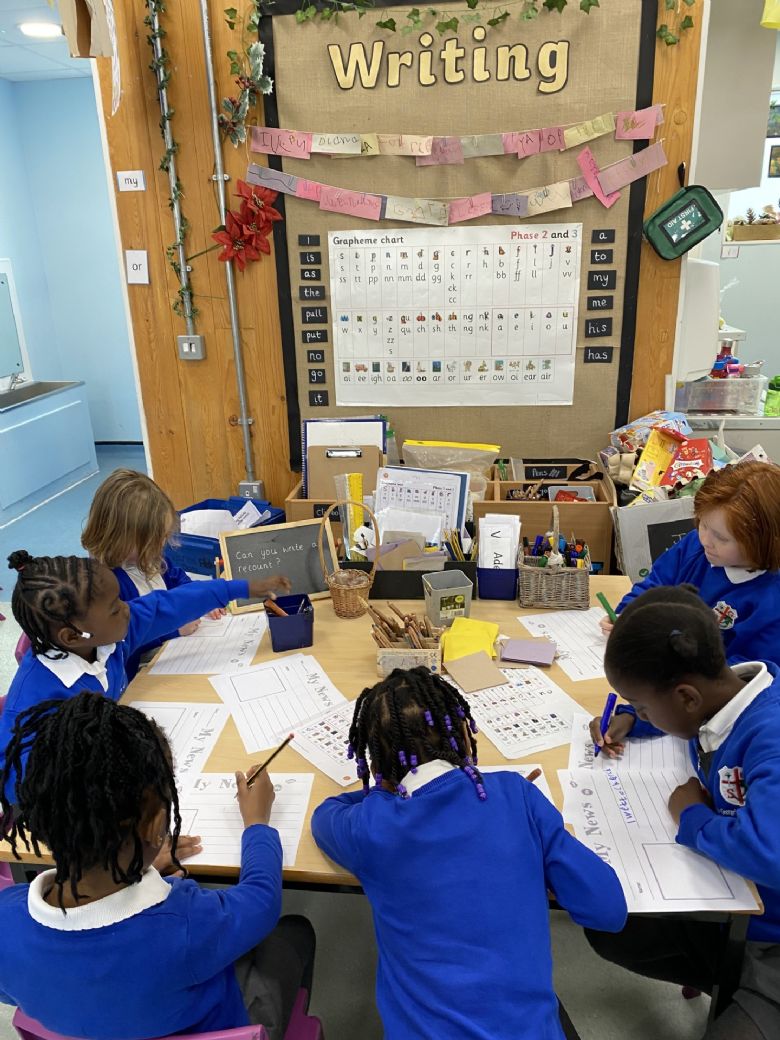
Our Maths area provides opportunities for children to explore number as well as shape and measurement. We sometimes set adult focus tasks for specific learning objectives linked to our mastering number scheme and the early learning goals but there are also opportunities for children to self-select and explore mathematical concepts.
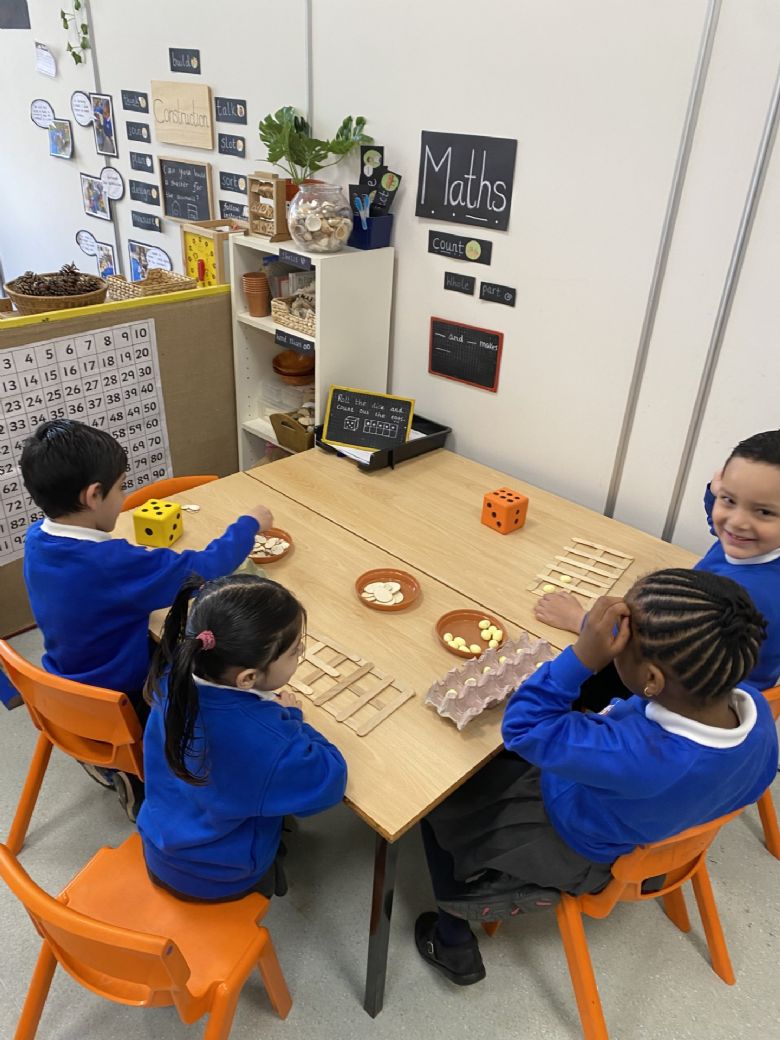
Outdoor Environment
A stimulating outdoor learning environment is key for young children, as playing, learning and having fun outdoors helps improve wellbeing and resilience; increases health through physical activity; provides children with the opportunity to develop a life-long appreciation of the natural world; and has a positive impact on educational attainment.
Our spacious outdoor area provides a high-quality, stimulating, learning environment for our children and has been designed and zoned to ensure that a wide range of learning can be accessed, for example:
Mud Kitchen
The Mud Kitchen allows us to strengthen learning for a wide range of Early Learning Goals covered by the Foundation Stage curriculum, with children developing the social skills of sharing and working together; using their creative and language skills as they develop their imaginative play; and their physical skills as they dig, mix and pour.
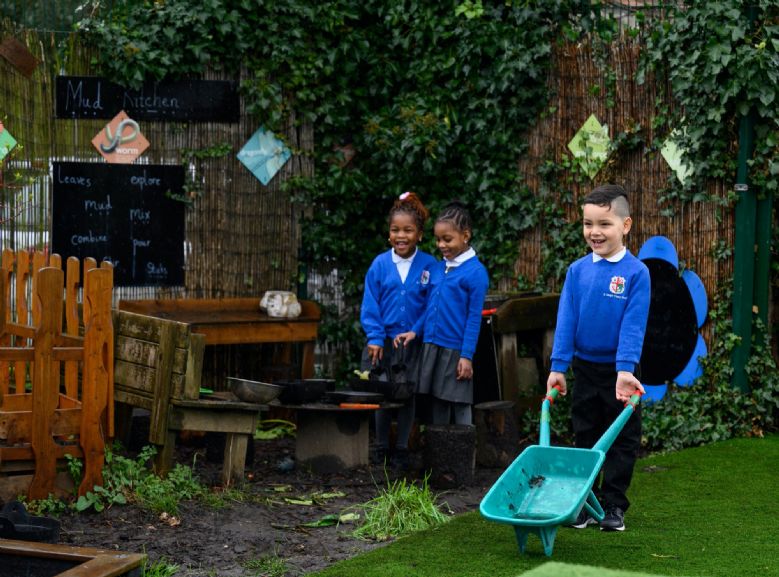
Nature Station
The Nature Station, where we grow and care for a range of fruit and vegetables, allows the children to develop their understanding of the natural world, the processes of growth and change, the changing of the seasons, and the weather.
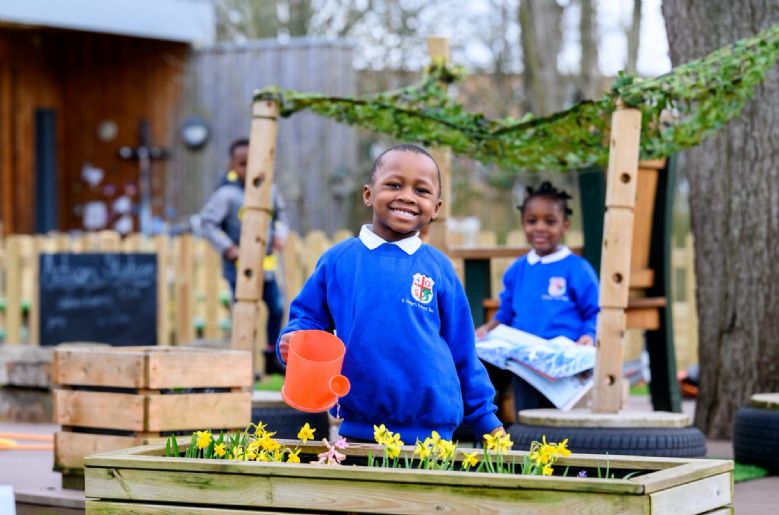
Action Station
Our Action Station provides children with opportunities to develop their strength, balance and co-ordination, and also to develop resilience and perseverance in the face of challenge and to learn to consider risk-taking and personal safety.
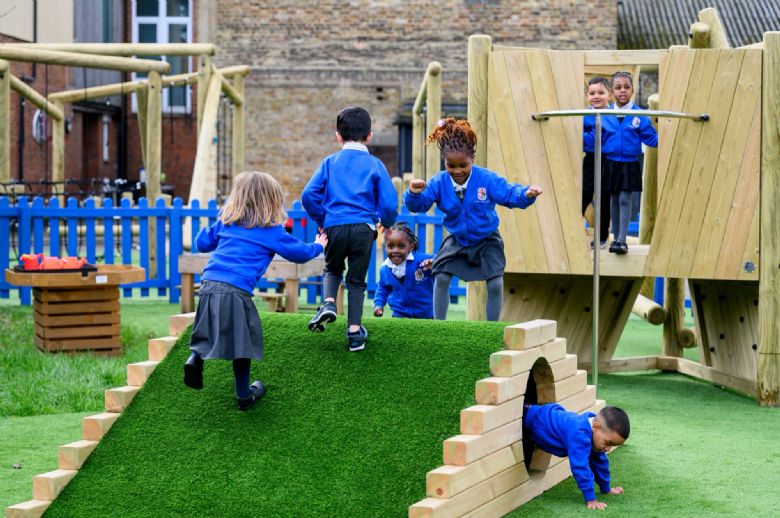
Exploration Station
At the Exploration Station there are lots of opportunities to build practical mathematical skills using water and sand: measuring, estimating, and learning about capacity. Scientific skills are also developed with a range of equipment - including water wheels, boats, sieves and funnels, and wet and dry sand.
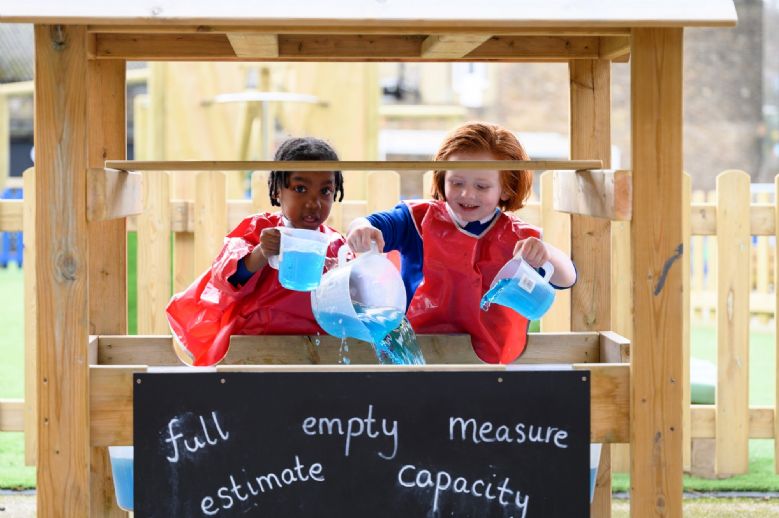
Builder's Yard
The Builder's Yard, which contains a range of small and large high-quality building equipment, is another great space to develop practical mathematical skills, but also language, team-work, creative skills and strength and co-ordination.
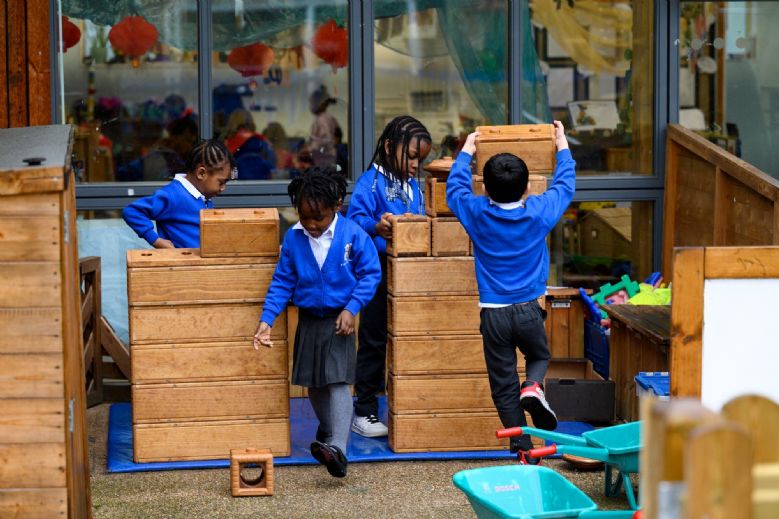
Early Reading
The National Curriculum specifies that all schools must teach children to read using phonics in Reception. Our school has chosen Little Wandle Letters and Sounds Revised as our Systematic Synthetic Phonics (SSP) programme to teach early reading and spelling. Our aim is for all children to become fluent, confident readers who love books!
Click on the image below to visit the Little Wandle Parent page which will support you and your child in their reading journey.
Early Number
We follow the NCETM (National Centre for Excellence in the Teaching of Mathematics) Mastering Number programme as well as guidance from Development Matters to teach number.
The Mastering Number project aims to secure firm foundations in the development of good number sense for all children from Reception through to Year 1 and Year 2. The aim over time is that children will leave KS1 with fluency in calculation and a confidence and flexibility with number. Attention will be given to key knowledge and understanding needed in Reception classes, and progression through KS1 to support success in the future.
A termly overview of Mastering Number in Reception can be downloaded below.
For more information click on the image below.
Adult Focus Activities
As well as providing a rich, purposeful environment we also have weekly adult focus activities. Children will have opportunities to apply their developing phonics to writing with an adult twice a week in their writing books. As part of our phonics programme, each child will take part in three weekly reading practice sessions. We also have adult focus activities for maths, RE, understanding the world and expressive arts and design. This is an opportunity for adults to enrich and extend the children's learning as well as assess and address misconceptions and gaps.
Please check out our school video to see some of our Early Year provision in action.

